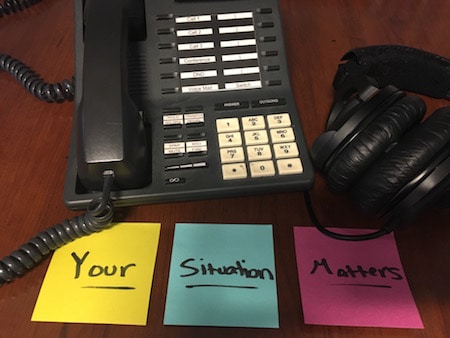Few opportunities in life allow one to feel as if you’ve made a meaningful difference in another’s life. For me, serving as a NAMI HelpLine volunteer is one of them—and this is why I do it.
With an eye to return to school for clinical social work, last year I sought out volunteer opportunities that would allow me to work with people in the mental health community. I learned of NAMI by sheer coincidence, when a friend introduced me to a fellow volunteer. I had never heard of NAMI, and although she spoke enthusiastically of her experience, the idea of manning a phone line to provide “information and resource referral” seemed less than the intimate, learning experience I was seeking.
I couldn’t have been more mistaken. Not a shift ends that I don’t sit back, reflect and thank my lucky stars for having had the chance to help someone that day; to share their frustrations and fears; to ease their pain; to point them toward hope, even if it’s just a little. As a NAMI HelpLine volunteer, I will often be the only voice of hope in the mental health resource chain who treats a caller with kindness, patience and respect.
On the NAMI HelpLine, we act as a compass to begin navigating a complex system of mental health resources—a process that moments before most likely seemed unnavigable and hopeless for the caller. And the calls are endless. You think an hour will go by and the phone lines might be slow, but they never are. There is always a need somewhere. And the needs are as personal as each human. Each call requires intense empathy, compassion, focus, patience and creative problem-solving, within a moment’s grasp. What we do is personal, and I love it.
We live in a world where listening is a dying art. Our callers need to be heard, not merely “listened to.” They need to know their situation matters. Often when I ask a caller, “How can I help you today?” I hear, “I don’t know if you can,” because prior attempts for help have been met with a lack of compassion and/or respect. Often, our callers have complex circumstances and the stakes are very high.
As a NAMI HelpLine volunteer, at the very least I need to listen and be kind; to let callers know I’m not going anywhere, and I’m going to do my very best to figure things out with them. I genuinely care to go the extra mile, by making sure the caller is okay and that they feel they’ve been heard before I say goodbye.
Almost every call closes with the caller sharing, “I can’t thank you enough. Before I called you, I didn’t know where to start. You’ve helped me so much.” I cannot fully describe how good it feels to be able to speak with a caller—who at the beginning of a call feels helpless and lost—and help empower them with a sense of dignity, calm and hope by the end of the call.
Each volunteer comes to the NAMI HelpLine with “lived” experience. Either we live with, care for, or have cared for a loved one with a mental health condition. We know personally the challenges, heart ache, devastation, helplessness and hopelessness. We are both compassionate and passionate about helping others who call us and are seeking help, because we’ve been there.
I have lived with clinical depression most of my life, and more recently, with anxiety and panic attacks. I understand all too well the loss of vitality, the desperation, the fear, the self-imposed shame and isolation, the fatigue of living each day bearing the weight of “okay-ness,” the frustration of losing weeks, months and even years to mental illness.
Worse, I know the frustration of working with psychiatrists who seemed to be little more than “dispensaries,” and what it is like to live with the denial that I didn’t need medication (only to finally give in and accept that I couldn’t live well without it). I know the impatience one experiences while waiting for a new medication to kick-in and what it’s like living through the side-effects. I know the desperation when a medication doesn’t work, and the ultimate relief when one finally does work. I know the incredible fortune of having the resources and resilience to find those gifted practitioners who were empathetic, caring healers who worked patiently with me to help me live a fulfilling life in every way. All of this has made me a more empathetic HelpLine volunteer. I field similar concerns every shift. And I am willing to share my story if it helps to alleviate fears.
Prior to my affiliation with NAMI, I had no knowledge of the many resources, both public and private, available to our callers. After almost a year on the NAMI HelpLine, it still amazes me how many resources there are, yet how little is known to most people. I wish I had learned many years ago of some that I now share with callers. It would have made my journey that much more bearable, or at the very least, to know that I wasn’t alone. And that I was heard.
Quinn Anderson is a NAMI Helpline Volunteer.
https://www.nami.org/Blogs/NAMI-Blog/August-2018-/Helping-Others-to-Feel-Heard-Matters
